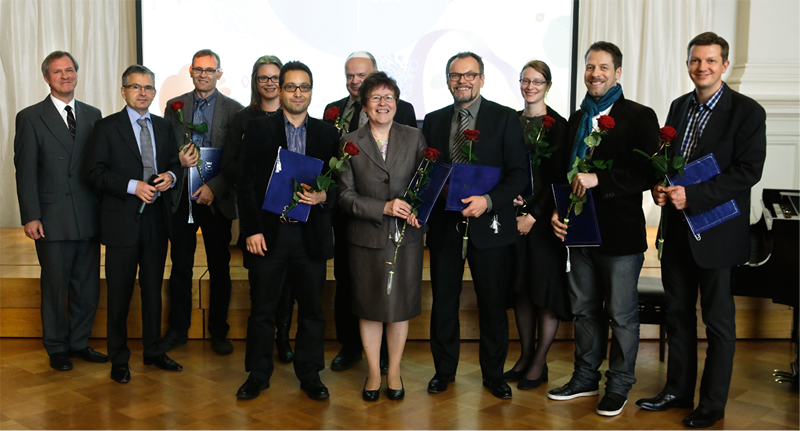UNLOCKING THE DATA RESERVES
Text Petja Partanen Valokuva Pertti Nisonen
Designed as a catalyst for unlocking public data, the Helsinki Region Infoshare (HRI) project has brought the cities of the Helsinki Metropolitan Area to the world’s forefront in unlocking city data. The vision is that anyone could follow and take part in decision-making from the beginning of preparatory process.asioiden valmistelun alkuhetkestä lähtien.
The word ‘democracy’ brings to mind a marketplace in Ancient Greece where the residents of a city convened to decide on common issues. The administration of the 1.3 million inhabitants of the Helsinki Metropolitan Area has moved a long way from this ideal. Four cities, dozens of city departments, public utilities and corporations, tens of thousands of employees – a rather complicated system, one might say.
Even so, today’s information technology provides us an opportunity to return to the roots of democracy, says Mayor of Helsinki Jussi Pajunen. One of the achievements of the HRI project is the creation of an interface to the electronic case management system of Helsinki. Since March 2013, all the meeting documents of the city are available to everyone through the interface. But Pajunen has set his sights even higher.
”My vision is that all the data on decision-making will be available to all.”
The documents are already public, of course, but ‘public’ does not always mean accessible. Decisions taken by the city are published on Helsinki’s website, but it is much more difficult for citizens to enter a discussion on issues yet under preparation. Paper copies of the documents are, in practice, available from the registry of the city but an average citizen may not have a comprehensive picture of all the issues under preparation within the city organisation. A simple Google search could reveal a lot – if only the information were available as open data.
”Technology will make this a success. By the end of the year, as large a share as possible of all the data of Helsinki will be available to the citizens”, Pajunen promises.
Pajunen wishes that the data of the cities would also come alive outside the city administration. ”When all data is available, the whole community can contribute to building a better city.
The aim of the HRI project is that the unlocking of the data reserves will soon be part of the everyday activities of the officials of Helsinki, Espoo, Vantaa and Kauniainen. This will not happen in an instant. According to Mayor Pajunen, there are many hindrances to the sharing of information. Some of these are simple psychology.
”Knowledge is power”, says Pajunen. Publishing our data in an open format may feel like relinquishing power. What is more, the process of opening data often means an increasing workload. Pajunen believes that the step is, nonetheless, worth taking.
”When you are inside an organisation, you become accustomed to a certain way of doing things. Open data makes it possible for outsiders to observe our methods of working and they may justifiably ask the question of whether our methods are the best or suggest something else instead.”
The fact that the open data reserves give an increasing number of citizens an opportunity to peek inside the walls of the city administration, as it were, can serve as an impulse to develop the city’s working methods.
Pajunen offers an example: the language of official documents, sometimes critically labelled as ‘officialese’.
”In the old times, it was enough that the proposals presented to the city’s decision-makers were correct from a legal standpoint.”
Since today the readers also include people unaccustomed to the decision-making jargon, the text must be understandable.
”In the future, any official writing a proposal on a council motion, for instance, must be aware that they are also communicating to the citizens about the activities of the city.
Besides the open data reserves, new communication tools also serve to increase openness. Facebook and Twitter, among others, are effective means of communication between the citizens and decision-makers.
”In five years’ time, the city as a public-sector actor will be far more public than today.”
Mayor Pajunen extends his thanks to the dynamos of the HRI project.
”I am delighted to see that HRI’s open knowledge philosophy is gaining ground also in the state administration and in other cities.”
But even the forerunner cities are only at the beginning of the journey. Jussi Pajunen leads the way in openness. Any mayor’s job involves making a lot of decisions affecting the residents’ lives. Through Helsinki’s Open Ahjo interface, anyone can monitor the decisions as open data stream.
“The Mayor’s decisions will be available before the summer.”
•
The texts of the publication are licensed under the 'HRI-nimeä' attribution. All reuse of the material must be accompanied by the name of the author (Petja Partanen or Terhi Upola) and the publisher (Helsinki Region Infoshare).
Helsinki opens public interface to its case management system
The electronic case management system Ahjo, adopted by the City of Helsinki in summer 2011, introduced a paperless office to the use of 5,000 officials and decision-makers within the city organisation. Today, all of these public documents are available to anyone interested.
”The public interface makes the data available around the clock. There is no need to call anyone or visit the registry at the City Hall”, says Katja Räisänen, senior expert of the Ahjo system.
In the first stage, the Open Ahjo interface provides access to the agendas and minutes of the City Council, City Government and the Committees. Most of this information is already available as HTML documents on the websites of each decision-making body. Through the new interface, the information is provided at one address, in machine-readable form, and with all attachments.
The transparency of the governance will soon take another leap forward. More decision-making data will be released as open data when the decisions of the mayors and other officials become available.
Soon after the launch of the Open Ahjo interface, a group of developers started a new project titled Open Helsinki.
.
Open AHJO -xml-interfaceopenhelsinki.hel.fi/files/
Open Helsinki -projectwww.openhelsinki.net
“My vision is that all the data on decision-making will be available to all.”
All open data of the Helsinki Metropolitan Area in one web service
“The documents of the city are public, but accessibility of the information has been a problem”, says Jussi Pajunen

The cities of the Helsinki Metropolitan
Area created in 2010 the Helsinki
Region Infoshare project, with the aim
of gathering all the public data reserves
from each city and publishing them for
free use by all.
The data catalogue on HRI.fi was
opened in March 2011. In November
2012, the project received the Mayor’s
Achievement of the Year Award from
Mayor Jussi Pajunen.

“Congratulations, you are the pioneers in the world”, praised the Mayor of Helsinki Jussi Pajunen in rewarding Helsinki Region Infoshare project.
